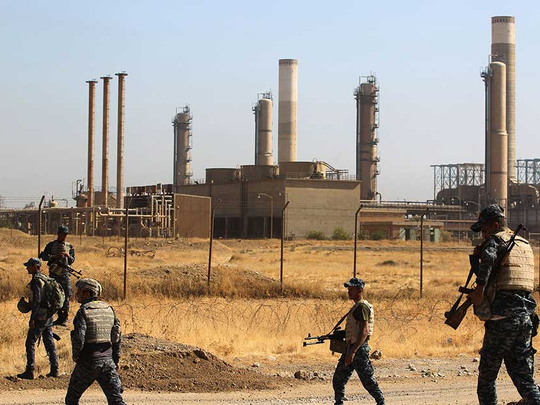
Abu Dhabi: Brent oil prices went up by more than 2 per cent on Monday on concerns over disruption in oil production in Iraq as government forces advanced into the oil-rich city of Kirkuk in Kurdistan.
According to a report by Reuters, Iraqi government troops had seized Kirkuk airport and had taken control of Northern Iraq’s oil company from the security forces of the autonomous Kurdish region, known as Peshmerga.
The military action was the most decisive step Baghdad has taken yet to rein in the independence aspirations of the Kurds, who have governed themselves as an autonomous part of Iraq since the fall of Saddam Hussain in 2003 and voted on September 25 to secede.
Oil production in Kurdistan region is estimated to be around 500,000 to 550,000 barrels a day, out of which Kirkuk’s share of output is about 150,000 barrels a day. Fighting is centred around Kirkuk region currently.
Brent crude, the global benchmark, was up 2.03 per cent at $58.33 (Dh214.24), its highest level in more than two weeks, while the US marker West Texas Intermediate climbed 1.61 per cent to $52.28 at around 4:43pm UAE time.
The rises add to recent strength in Brent crude, which in September touched its highest level since January, and has not surpassed $60 since the summer of 2015.
“Oil has started the week strongly higher in Asia, building on the more than 1.5 per cent gains seen on Friday. The commodity has been pushed higher as the conflict between Iraq and Kurdistan escalated with the advance of Iraqi forces into oil-rich Kirkuk,” Mihir Kapadia, CEO of Sun Global Investments told Gulf News by email.
“While there is an ongoing political feud, it’s out of the best interest of both sides to not disrupt oil production “Oil prices are expected to average around $56 per barrel for the last quarter, and can well tease into the $60 mark.”
Jaafar Altaie, managing director at Dubai based Manaar Energy Consulting told Gulf News by phone that Iraq will benefit from cutting Kirkuk production because it will raise oil prices and allow Iraq to have extra profit. Iraq is also trying to raise oil production from the South.
He said the two losers will be Kurdistan because it will lose extra revenue and Turkey will lose its oil transit fee.
“The regional market has more of a stake in Kirkuk than global market,” he added.
Oil from Kurdistan region is transported to European markets via a pipeline passing through Turkey.
The rise in oil prices could be for a short term unless the fighting gets worse, according to Altaie.
“The reaction so far is one per cent or two per cent spike in the oil prices by and large. Fighting is not expected to continue for a long time,” he said.
Rising tensions between the US and Iran is also adding support to oil prices. In a speech on Friday, President Donald Trump refused to certify Iran’s compliance with the nuclear deal raising tensions between the two countries.












